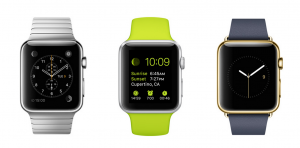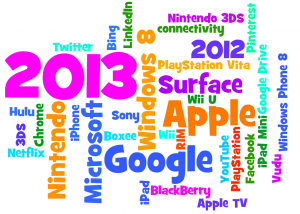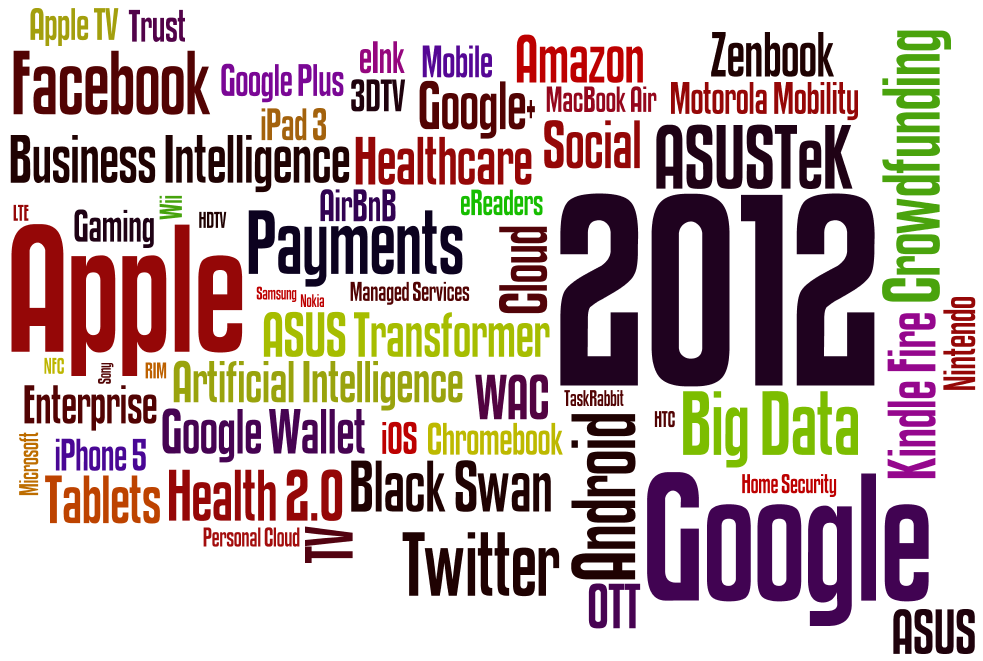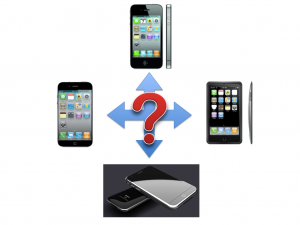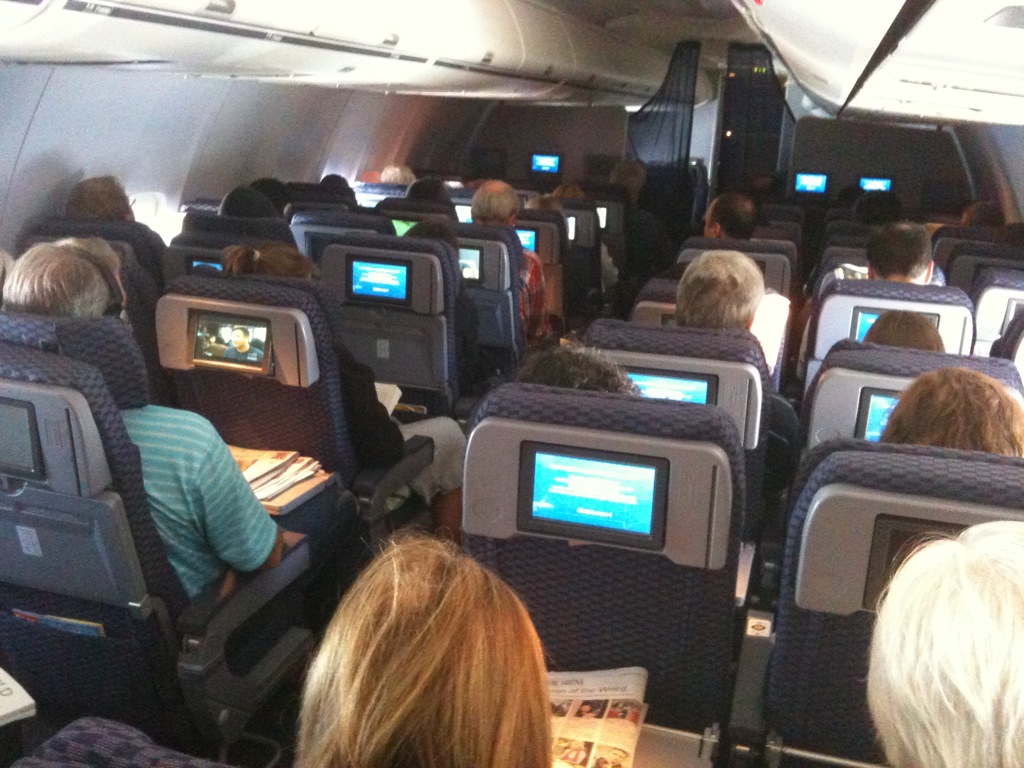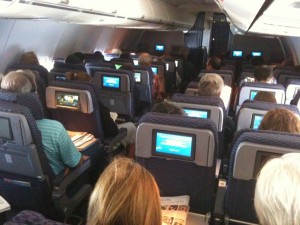Originally posted Nov 21, 2006 on Blogger:
That’s it. I took the plunge. Just as life couldn’t be much busier, I decided to share with you my very recent experience.
I’m now on a flight between Tel Aviv and Frankfurt, on my way to South Africa (for a mere 10 hours… HELP!). However, this flight conflicted with a conference call and WebEx that I had scheduled with over 15 participants. Changing the conference call time would have postponed it too much, delaying many dependent activities. Therefore, I decided to try out all the technologies available and to connect with the conference call from the flight. Thankfully, on this Lufthansa flight there’s wireless Internet connectivity that LH have branded FlyNet. For $30/flight or $10/hour, I can connect to the Internet and my VPN. I then proceeded to use the following technologies in combination in order to actually participate in the conference call:
- WiFi to hook the laptop up to the WiFi access point on the plane
- Satelite link for bi-directional Internet while in flight at 36,000 feet in the air
- Skype to perform a VoIP conversation
- SkypeOut to call for free to a colleague of mine in the US
- My colleague connected me through the internal network to our company’s office in Israel to my assistant, who connected me to an active conference bridge
- WebEx was used to chat with the participants as well as see the presentation live, as everybody else was seeing it
- Bose noise canceling headset as my earphone to hear the conversation crystal clear without noise while in the air
- IBM Thinkpad built-in microphone captured my voice. I had to mute it when I wasn’t speaking, but that was the only minor inconvenience
This impressed me – a fully productive flight from Tel Aviv to Frankfurt. I proceeded to call a bunch of my friends over Skype until just now, when I got the urge to document my experience.
Now the catch – they’re about to pull the plug on all this technology. Connexion by Boeing that operates the service for Lufthansa (and all other airlines in the world) has notified its customers that it is going out of business and pulling the service at the end of 2006. That would be a pitty. In our always-on, connected, world, having the ability to connect to the Internet, and through it to all communication, information, and entertainment in the world, is going to be assumed. It is hard to believe that this service is really going to have a hiccup and shut down.
True, not everybody wants to be connected all the time. Many see flights as a way to “disengage” and “disconnect”. I believe this is a temporary situation – the next generation might no longer feel that way. In any case, that’s a choice anybody can make. The nice thing about airplanes is that they are such noise environments and everybody is already shielded with some noise reducing (active or passive) mechanism, that it is hard to interfere with your neighboors on the flight. Especially if you have a headset with a boom to capture your speech right from your mouth.
Obviously, a huge capital investment went into Connexion by Boeing. In fact, they were my customer in the past and we helped them a bit putting the back-end of these systems in place. As with the Air Phone service, I believe it wasn’t marketted successfullly nor priced correctly. They really needed to get people addicted and gradually raise the price. Air Phone was priced at $3-10 per minute for many years. It became such that people understood that this is a luxury-only service (not even suitable for the average business traveler / road warrior). The mindset was set so well that even though in the last two years the price was dropped to $0.69/minute (domestic US) for Verizon Wireless subscribers or $0.10/minute when a subscriber pays $10/month. That made it so reasonable that I was a frequent user. All my mobile phone calls came right to my seat when I was on domestic calls in the US. Well, I’m sad to say that Verizon also decided to pull the plug on this service, and it too, has recently been shut down (or is about to be shut down very shortly). Mostly – nobody knew about it, or was made to understand the value…
What’s the message here? Companies that market such advanced products really need to get to the right customers, market effectively, sell effectively, and price effectively. There are, obviously, massive investments – but isn’t it a shame that only the companies that buy out these assets at bargain-basement prices will really reap the benefits of the technology?
While not a surprise, it appears to have evaded Connexion by Boeing and Verizon that getting the technology to work in a carrier-grade fashion is a far cry from commercial success. The investment in changing customer behavior to use the disruptive service was critically overlooked.
Unfortunately, many of the same mistakes are happening these days as most of the world’s service providers are rolling out IMS and NGN network infrastructures. They often overlook the key factors that will make their services commercially viable or total commercial flops. Service providers must focus on rolling out customer experiences – not networks nor services. Only then, will they be able to capitalize on this potential. This, of course, is not the only advice – but it is an important lesson too often overlooked.
I don’t guarantee many more of these – but who knows? I might like it…
Update on December 24, 2007:
At last, I see a future for in-flight Internet access. Multiple technologies with more viable approaches are emerging. These are all described in this article. I’m still a believer that the more long-term acceptable solution would be satelite-based rather than ground based – given that the value of in-flight Internet is more valuable on longer haul flights that tend to span the 80%+ of our planet that is covered with the water. In any case, I’m still waiting to reemerge as an in-flight Internet user once service resumes. Until then, I tend to sleep more on flights than I ever used to. Would love to hear feedback.
